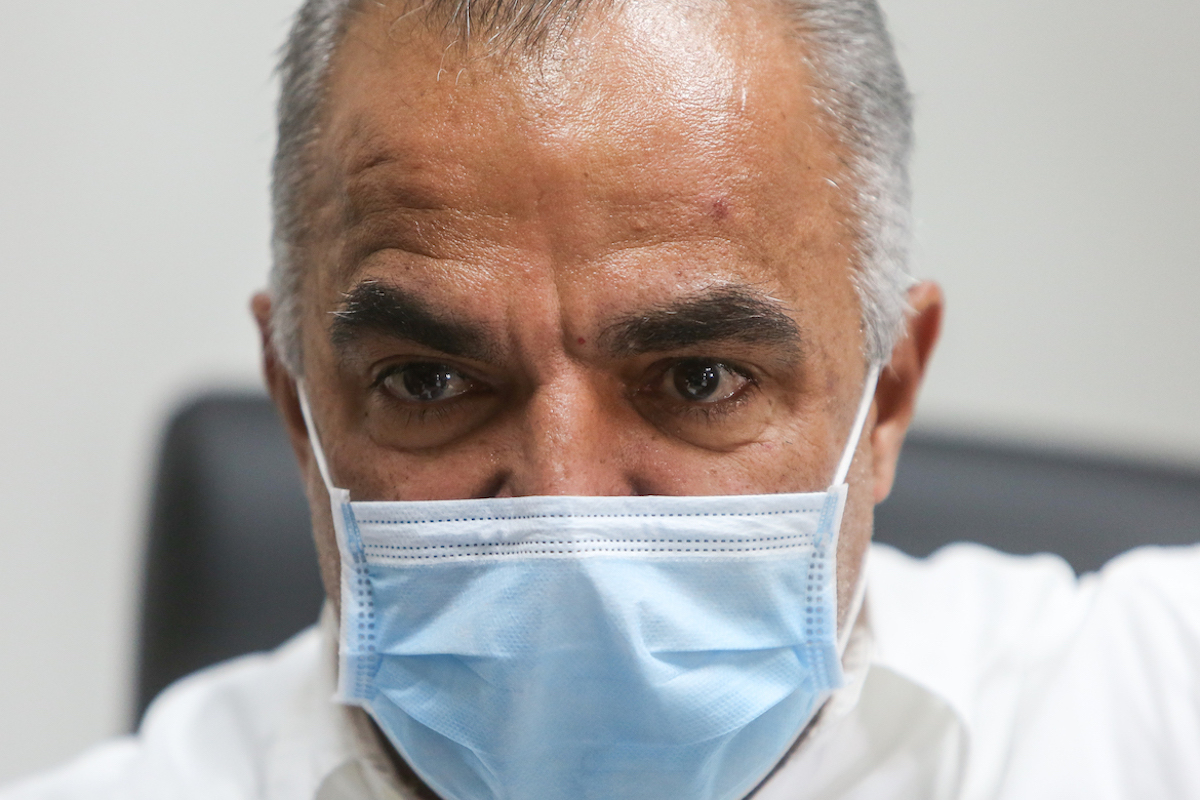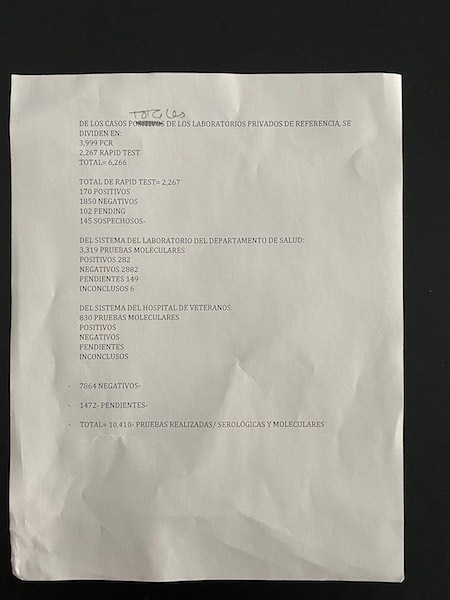

Puerto Rico’s Health Department Secretary Lorenzo González on April 17, 2020 (Photo by Nahira Montcourt | Centro de Periodismo Investigativo)
By Luis J. Valentín Ortiz y Carla Minet | Centro de Periodismo Investigativo
Versión en español aquí.
SAN JUAN, Puerto Rico — Bad news about the COVID-19 epidemic in Puerto Rico hit Friday morning like a bucket of cold water: the Health Department had been incorrectly reporting data on infections on the island for the past four weeks.
Health Secretary Lorenzo González acknowledged Friday to the Centro de Periodismo Investigativo (Center for Investigative Journalism, CPI for its acronym in Spanish) that the agency has been mixing the results of molecular tests, which confirm that a person has the virus, with results of serological tests or “rapid test kits,” which should not be used to inform infection status, says the U.S. Food and Drug Administration (FDA).
The implications: There has been a double, perhaps even a triple count of test results in Puerto Rico’s official COVID-19 statistics. For example, a person who tested positive on the rapid test and then had a molecular or “PCR” test confirming that positive, it can be counted as two separate cases in the numbers reported by the Government.
The CPI asked if the current number of confirmed cases of COVID-19 in Puerto Rico has a double or even triple count.
“Yes, it does,” the health secretary said. He explained that there are patients who test positive and when they recover, they can have other tests to see if it is already negative. “That patient has had two, potentially three tests,” González said, confirming that the results of those two or up to three tests would individually enter into the figures, despite being from the same patient.
“That is the truth of the existing system. We definitely have to debug it,” González said.
So, the data so far for Puerto Rico is not reliable, the CPI asked.
“Well, it’s the data we have,” the public official admitted. “All 50 states in the United States, and I’m not defending myself, like the rest of the world, nobody has accurate data right now.”
With regard to statements made in a press conference Thursday by him and Puerto Rico Gov. Wanda Vázquez Garced, assuring that the numbers the Government provides were correct, González said on Friday: “I’m not going to defend what you can’t defend, you will never get that from me, so yes, we have things that we have to improve. I tell you that from the heart. So when we spoke yesterday with the guys, with all the people who are here devoted to doing this, I said to them, ‘He’s right, as much as I could have argued [yesterday],’ although I don’t argue with anyone, it just got a little heated. But you were right. So yes, I give it to you. And based on this, we have to resolve this [and have] categorically clear protocols. We have to solve the double whammy, the double tests that we have, how we debug the system, and we have been working on that since yesterday. How to debug the system so that there’s no double count.”
As of Friday, Puerto Rico had 1,068 confirmed positive cases of COVID-19. Within that number, 170 came from rapid test results, which were not necessarily confirmed with a molecular or “PCR” test, according to the data that the Health Department provided Friday.
The CPI revealed this week that the Health Department lacks an effective and centralized process for receiving and reporting rapid test results, which has prevented the agency from offering reliable information so far. Although thousands of rapid tests have been distributed to hospitals and health centers, the Government of Puerto Rico also had no control over what happened to these tests once they were distributed.
The secretary accepted these problems and said he has known about them since he came to the agency, although almost three weeks later, he admitted they haven’t been resolved.
“I wasn’t giving it the necessary follow-up,” the secretary admitted to the CPI. He said following CPI questions during Thursday’s press conference, he realized that the numbers that the agency had been presenting were incorrect.
González and his team announced that the Health Department is working on a new protocol to report test results in a segmented way (molecular vs. serological) and that they would be correcting the data provided so far.
According to Health Department data —broken down for the first time for the CPI on Friday— 2,267 rapid tests have been carried out from a total of 351,500 that have been purchased. Of the number of tests performed, 170 positives entered the official count of confirmed COVID-19 cases, some of which lacked a confirmatory molecular test.
González explained that rapid or serological tests have been used in Puerto Rico and if they show positive, a PCR does not need to be done to confirm that the patient has the disease and was not a false positive.
The health secretary’s instruction is: “If the rapid test shows positive, it is positive.”
But this would go against current protocols for managing the pandemic, admitted David Capó, the government’s lead epidemiologist, and Jessica Cabrera, director of the Biosafety Office.
“In terms of protocol, it is supposed to be confirmed with a PCR [test],” Capó explained, adding, “it is supposed to be that the positives and the negatives are confirmed, that they are all confirmed.”
Cabrera agreed. “Usually the rapid test is used for surveillance. He [Health secretary] believes if the test is positive, he adds it to the total.”
“And is that right, epidemiologist?” the CPI questioned.
“It’s supposed to be confirmed,” Cabrera said.
“The positives and the negatives are supposed to be confirmed, all of them must be confirmed,” Capó added.
“Did you know that as of today, there are positive rapid test cases included in confirmed cases?” the CPI asked Capó.
“Well, right now we are in that process,” he said.


Document provided by the Health Department to the CPI.
As an exception, the protocol being followed with tests being done at the airport and on emergency workers calls for performing only molecular tests on them, to have reliable confirmation.
However, this protocol is not being followed with the rest of the population.
Capó said Friday that the Health Department is evaluating changing the directive given to hospitals and health centers.
“Is it possible for you to change the numbers and fix them to reflect separate positive rapid tests from molecular ones?” the CPI asked.
“What we are considering is to inform them separately.[…] All of the rapid tests that came up positive are supposed to be confirmed,” he said.
Distributed Tests Remain Unused
Another problem with the rapid tests is that the government has distributed thousands of them but didn’t know if they were being used. Of the nearly 100,000 tests that have been distributed to date —including more than 7,000 tests over the past two weeks— only 2,267 have been used.
“We have, for practical purposes, 97,000 tests distributed in Puerto Rico that are not generating any benefit for us,” said González, who admitted that although he knows where the agency distributed rapid tests, “it’s not categorically clear how much of what was distributed is being used.”
“When we look back now and realize that 100,000 rapid tests were distributed here and are out there. They are not producing results for Puerto Rico. This is the truth. That’s a valid point and I give it to you 100%. You made us think clearly. Obviously, the argument is, ‘if they are there, why aren’t hospitals and centers using [these tests]’?”
So far, Puerto Rico has the lowest number of tests done when compared to states and territories of the United States, according to data compiled by the Center for a New Economy.



[…] SAN JUAN, Puerto Rico — Bad news about the #COVID19 epidemic in Puerto Rico hit Friday morning like a bucket of cold water: the Health Department had been incorrectly reporting data on infections on the island for the past four weeks. https://www.latinorebels.com//2020/04/18/puertoricohealthdepartmentcovid19mathwrong/ … […]
[…] being said, the Center for Investigative Journalism (CPI, in Spanish) reported on Friday that the Health Department’s COVID-19 numbers are wrong, saying the department has been […]
[…] English version here. […]
[…] Investigativo (CPI, or Center for Investigative Journalism, in English) that his agency has been erroneously reporting the number COVID-19 positive cases. González told CPI that positive cases are being double- and maybe even triple-counted, because […]
[…] Thursday press conference fiasco happened the day before the island’s Secretary of Health told Puerto Rico’s Centro de Periodismo Investigativo that the data surrounding current COVID-19 […]
[…] After experiencing a problem of duplicate and triplicate cases in the reports for COVID-19 tests and results, Puerto Rico’s Health Department revealed a revised number of positives on Tuesday and as of Wednesday it was the last figure available. […]